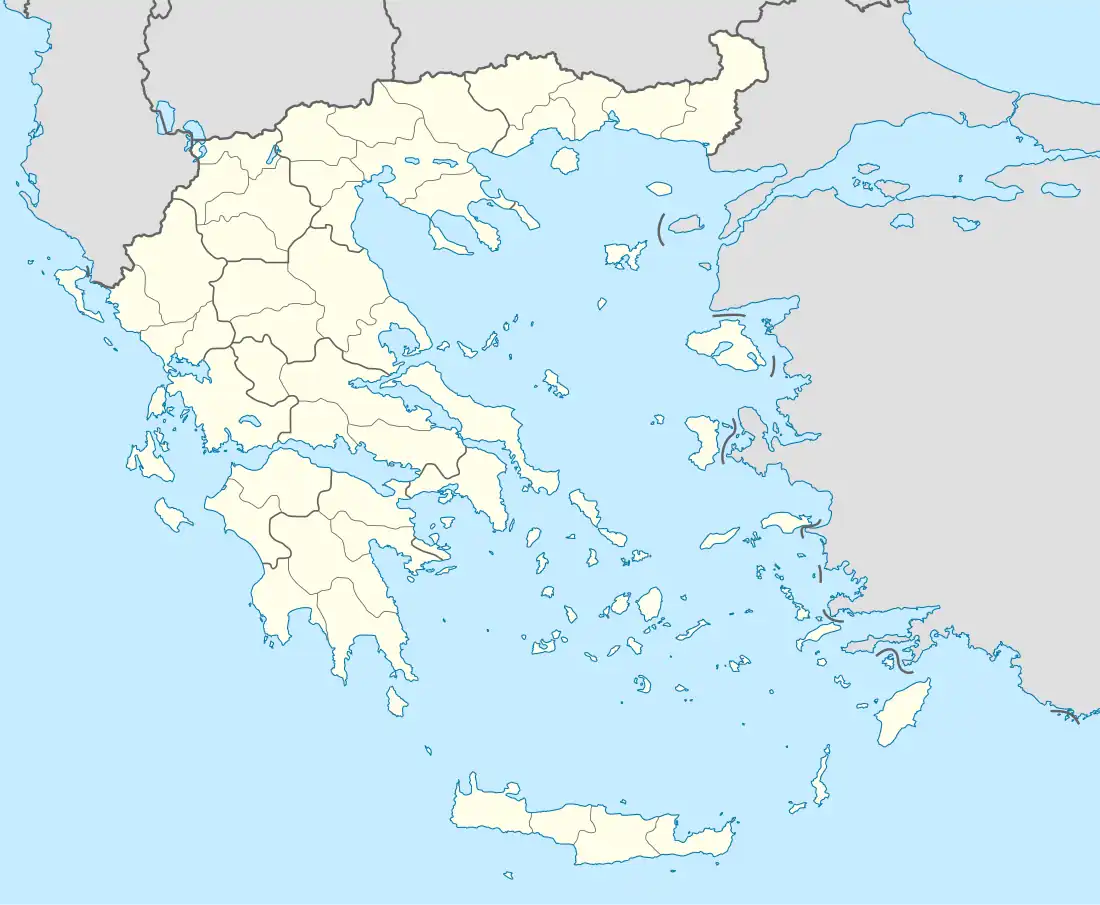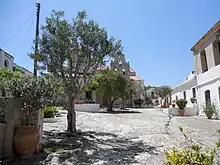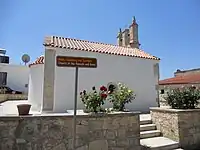Roustika
Roustika is a local community of the Rethymno Municipality in the Rethymno (regional unit) of the region of Crete established by Kallikratis reform. Previously, it was part of municipality of Nikiforos Fokas. Capital of the new municipality is Rethymnon. It is traditional settlement and is classified in Class II, that is of average cultural value (Government Gazette 728/21-9-1995).[2] In 2005 Roustika was awarded as a "'clean and organized traditional community"' [3]
Roustika
Ρούστικα | |
|---|---|
 Roustika | |
| Coordinates: 35°17′13″N 24°22′26″E | |
| Country | Greece |
| Administrative region | Crete |
| Regional unit | Rethymno |
| Municipality | Rethymno |
| Municipal unit | Nikiforos Fokas |
| Community | |
| • Population | 203 (2011) |
| • Area (km2) | 4.550 |
| Time zone | UTC+2 (EET) |
| • Summer (DST) | UTC+3 (EEST) |
| Postal code | 74055 |
| Area code(s) | 28310 |
| Vehicle registration | ΡΕ |
Geography, origin of name, history
Roustika is located twenty kilometers southwest of Rethymno at an altitude of 290 m [4] at the foot of the hill Ambelos. Roustika existed before the conquest of Crete by the Venetians. The name could originate from the Arabic word Roustak (which means: village) and it is believed that the Venetians adapted the name to their language as Roustika. Others believe it originates from the Latin word rustic (=rural).[5]
- Population of Roustika [6]
| Name | 1928 | 1940 | 1951 | 1961 | 1971 | 1981 | 1991 | 2001 | 2011 |
|---|---|---|---|---|---|---|---|---|---|
| Roustika | 514 | 546 | 441 | 354 | 261 | 251 | 233 | 261 | 150 |
| Palelimnos | 105 | 122 | 90 | 91 | 93 | 73 | 76 | 104 | 53 |
| Total | 619 | 668 | 531 | 445 | 354 | 324 | 309 | 365 | 203 |
Attractions: Temples, important buildings

The monastery of Prophet Elias with the Byzantine church of Prophet Elias (Profitis Ilias), Agia Triada and Agia Zoni is a three-aisled basilica with a dome, has a bell tower with two bells and an inscription of 1637.[3]
Panaghia Church (Church of the Assumption of the Virgin Mary): This two-aisled church dedicated to the Holy Virgin and Christ the Saviour is situated at the location called Livadi of Roustika. The walls in the interior of the church are covered with frescoes dating back to 1381. The belfry shows the inscription of the year 1627.[3][7]

Spiritual - Cultural Center Anestis and Manolis Anagnostakis (private collection): Manolis Anagnostakis was a poet, one of the leading poets of the first postwar generation with origin from Roustika, the birthplace of his father. The Spiritual - cultural center Anestis and Manolis Anagnostakis is housed in the family home, which was donated to the community of Roustika by the poet himself.[8]
The Museum of Traditional Greek costumes Kate & Andreas Fragkiadaki housed in ROUSTIKA MELATHRON[9]
Miscellaneous
There is a festival to celebrate the Prophet Elias (20 July).
There is public bus service (KTEL) from/to Rethymno (two services, morning and noon on weekdays and no services on weekends)[10]
External links
- Photo Gallery, Web site of municipality of Rethymnno retrieved at 10 April 2012
- Cycling routes, Web site of Tourism Promotion Committee of Rethymno Prefecture, retrieved at 10 April 2012
- Route: Rethymno - Atsipopoulo - Aghios Andreas - Ano Valsamonero - Monopari - Roustika - Aghios Konstantinos - Argyroupoli - Episkopi, Tourism Promotion Committee of Rethymno Prefecture retrieved at 10 April 2012
References
- "Απογραφή Πληθυσμού - Κατοικιών 2011. ΜΟΝΙΜΟΣ Πληθυσμός" (in Greek). Hellenic Statistical Authority.
- Ministry of Environment, Archive of Traditional Settlements and Listed Buildings Archived 2012-04-05 at the Wayback Machine retrieved at 10 April 2012
- "The rewarded settlements in Rethymno, Roustika". Tourism Promotion Committee of Rethymno Prefecture. Retrieved October 4, 2012.
- Papyrus Larousse Britannica, Athens, 1996, Volume 52
- Left. Kryovrysanakis, Rethymniotikos Digest, Typospoudi versions, Rethymnon 1993, page 185
- Hellenic Statistical Authority, Digital Library (ELSAT), Census (Greek and English)
- "Churches and monasteries, Panaghia in the village of Roustica". Tourism Promotion Committee of Rethymno Prefecture. Retrieved September 4, 2012.
- "Private collections in Rethymno, Spiritual - Cultural Center Anestis and Manolis Anagnostakis". Tourism Promotion Committee of Rethymno Prefecture. Retrieved October 4, 2012.
- "Private collections in Rethymno, Museum of Traditional Greek Costumes "Kate & Andreas Fragkiadaki"". Tourism Promotion Committee of Rethymno Prefecture. Retrieved September 4, 2012.
- Bus timetables, Roustika (in german) Archived 2013-03-21 at the Wayback Machine